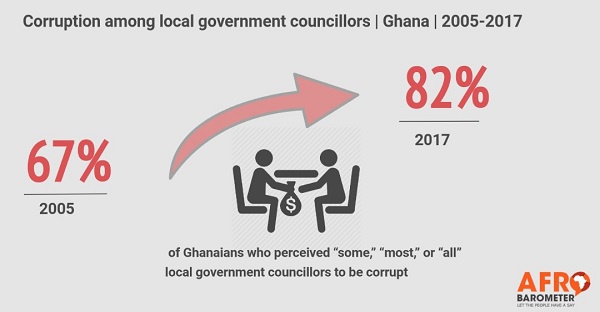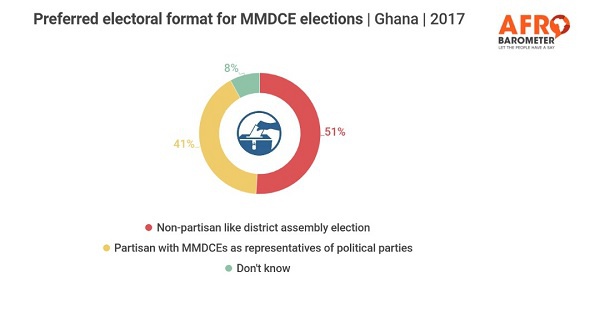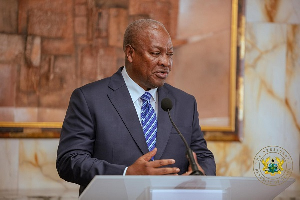General News of Tuesday, 27 February 2018
Source: www.ghanaweb.com
More Ghanaians back calls for election of MMDCEs - Survey
There has been a nine percent increase in people’s preference of an election for the position of Metropolitan, Municipal and District Chief Executives (MMDCEs) between 2008 and 2017.
This is according to a recent Afrobarometer survey conducted by the Center for Democratic Development (CDD). The survey, which was conducted between September 9 to September 25, 2017, had 2,400 respondents who were located in 300 enumerated areas spread across 293 towns in 171 districts in Ghana.
It indicated that support was strong across regions, demographic groups and major political parties.
Last year, news of massive agitation in some parts of the country made the headlines when President Akufo-Addo nominated some 212 MMDCEs for approval.
While some were approved amidst strong opposition from some assembly members, others were rejected. This situation, subsequently led to the President reiterating his campaign promise to push for the election of MMDCEs to eliminate the contentious “nominate and approve” approach.
Presenting the findings to the Ministry of Local Government and Rural Development, the media and other civil society organizations, Senior Researcher at CDD-Ghana, Newton Yaw Norviewu said 69% of Ghanaians “agree” or “strongly agree” that MMDCEs should be elected by voters in the local government authority areas.

Whereas a slim majority (51%) say the election should be non-partisan, a sizeable minority say they would prefer a partisan MMDCE election.
The research, according to Mr. Norviewu “also indicates that large majority of Ghanaians perceive that “some” MMDCEs, local government councillors, parliamentarians, judges, the presidency and government officials are corrupt. This means a 15% increase in public perception from 2005 to 2017.
Further research shows that 65% of Ghanaians believe their government councillors do not “listen” to them, while 75% of Ghanaians say they are optimistic their opinions are not considered by Members of Parliament. It was further revealed through the survey that, since 2005 to 2017, there has been a 14% increase in the number of Ghanaians who believe it is the responsibility of the voters to ensure that local government officials do their job.”
Interesting facts highlighted in the presentation included the massive approval by supporters of the various political parties including the governing New Patriotic Party to abort the election of MMDCEs. However, in the Upper West Region, a majority of Ghanaians representing 52% want the status quo of appointing MMDCEs to be maintained.
Overall, 55% of Ghanaians also said they will prefer to speak to their religious leaders than a government councillor or a Member of Parliament.

Speaking on the findings, Executive Director of the Institute for Democratic Governance, Emmanuel Akwetey called for further research into why some Ghanaians will opt for a partisan election, and what such governance will entail.
According to him, the interest by Ghanaians for an election showed how broken the system is and the general desire to have people lead base on their competence and not popularity.
The Deputy Minister for Local Government and Rural Development, O.B Amoah lauded CDD-Ghana for the research.
According to him, the findings will go a long way to help the ministry.












